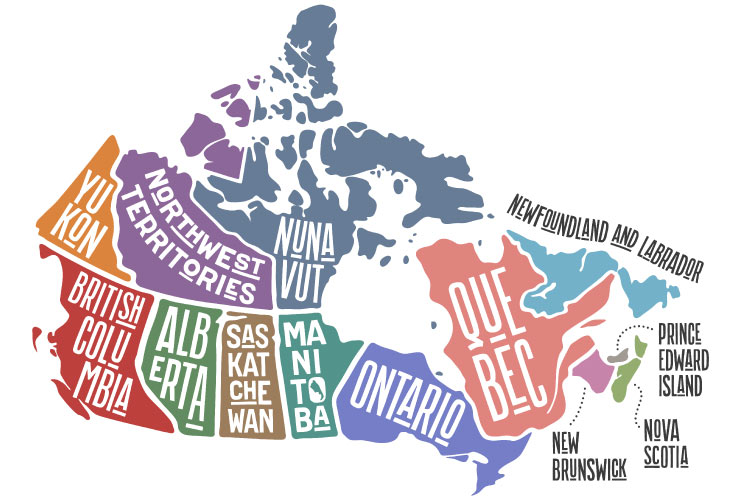
Retiring in Canada: What Every American Needs to Know About Life in the Land of the Maple Leaf
Canada Retirement
As the second largest country in the world in area, Canada offers a decent standard of living that includes great healthcare, beautiful summers, stunning natural attractions, and more of a laid-back style of living that’s perfect for spending your retirement years. In fact, Canada’s current population passed 41 million this year, and nearly a quarter of that growth is due to immigration. Here’s what you need to know if you’re thinking about being among them and retiring in Canada.
What Americans Retiring in Canada Need to Know
If you’re considering retiring in Canada, you may be focused on the quality of life, culture, and other social aspects. While that is absolutely vital to having an enjoyable retirement, there are a few less-fun factors to assess, like how you’ll become an official Canadian resident, how you’ll handle your taxes, and if you need additional insurance.
How To Retire in Canada: Visas and Citizenship
Can Americans retire in Canada? They sure can — if they have a visa. One of the easiest ways for a U.S. citizen to immigrate to Canada is to already have a family member who lives there. For example, grandparents and parents can if they have grandkids or children living in Canada, which is a type of visa that allows people to stay in the country for up to five years. However, it doesn't provide you with health coverage and some of the other privileges permanent Canadian residents are receiving.
The immigration path to Canada may be a little bit more tricky if you don’t already have family living there. There is no in Canada; however, if you don’t plan on staying in Canada year-round, you could apply for a . This visa allows you to spend up to six months at a time in the country — perfect if you want to spend the rest of your time somewhere warmer perhaps!
If you’ve been in Canada for at least three consecutive years and are ready to make retiring in Canada a more permanent arrangement, then you can toward becoming a Canadian citizen.
How To Retire in Canada: Filing Your Taxes
If you’re headed into retirement, you most likely have at least one retirement savings account, such as an IRA or 401(k). In Canada, withdrawals from these accounts are generally taxed as foreign income, but the helps prevent double taxation by allowing tax credits for taxes paid in the U.S. on these withdrawals. Plus, if you have a Roth IRA, you pay taxes on contributions but the .
How To Retire in Canada: Social Security Benefits and Health Insurance
If you have U.S. Social Security benefits, you’re likely wondering if you’ll still receive them in Canada. The answer is yes, you can generally receive your U.S. Social Security benefits without interruption. The U.S. has agreements with several countries, including Canada, to ensure that while living abroad.
We’ll talk more about Canada’s healthcare services later in the article, but if you’re retiring in Canada, you’re probably wondering, “Can you retire to Canada without purchasing health insurance?” And it’s a fair question, as Canada does have public health insurance, which . However, some medical needs won’t be covered by this plan, like dental care, eyeglasses, and prescriptions.
If you’re interested in retiring in Canada, keep reading because we have even more information to share, from the pros and cons of retiring in Canada to breakdowns of certain areas and how they compare to their American counterparts!
Retiring in Canada — FAQs
Q: How much money do you need to retire in Canada?
A: The in Canada for one person is around $1,070 per month, not including rent. Don’t think that’s all retiring in Canada will cost you, though. Canadians spend on housing and utilities. You’ll want to budget for , as well.
Q: Can a U.S. citizen retire in Canada?
A: Wondering, “Can a 65 year old immigrate to Canada?” The answer is yes, a U.S. citizen can retire in Canada — even a U.S. citizen at retirement age! It’s especially easy if you already have a family member who lives there — particularly a child or grandchild — but there are other ways to retire there if you don’t.
Q: Is it better to retire in Canada or the USA?
A: If we’re only looking at the facts, retiring in Canada is likely preferable to retiring in the U.S. because Canada has a slightly lower cost of living and publicly funded universal healthcare that’s available to citizens their entire lives. Additionally, Canadian retirement accounts have and fewer distribution limits than American ones.
Q: Where do most Americans retire in Canada?
A: Offering the perfect combination of relaxation and adventure, Victoria, BC, is one of the most popular spots for Americans retiring in Canada to relocate to.

How much does a routine physical cost you in Canada? Oh, about zero dollars out of pocket.
The Pros and Cons of Retiring in Canada
To give you a better idea of Canada’s living perks, along with a few disadvantages, check out these pros and cons of retiring in Canada.
Pro: Great Healthcare System
Con: Harsh Winter Weather
Can you retire to Canada if you don’t like cold weather? You can… but you may not enjoy the winter months. Retiring in Canada means getting used to low temps. Many expats know that Canada has chilly winters but are still surprised at the harsh conditions that most Canadian provinces experience.However, if you are looking for a , you can find that in a place like Vancouver! Remember, though, you’re still going to need warm winter gear no matter where you settle in the country.
Pro: Welcoming and Friendly Culture
Con: Cost of Living
are also a major concern for people in Canada. Due to the lack of supply and the high prices in certain cities, such as Vancouver and Toronto, people have to spend a lot of money on housing. One way to lower these costs is by moving to a smaller town.

Whether you’re a nature lover or a cultural aficionado, there’s a spot for you in Canada!
Finding the Best Places to Retire in Canada for You
Retiring in Canada is a popular option because of the country’s stunning natural beauty, friendly people, high-quality healthcare, and lots of fun outdoor activities to engage in. While Canada’s big cities offer great amenities like great public transportation, better jobs, and lots of entertainment options, many of its small towns are in close enough proximity to the country’s bigger cities with unique perks of their own. Check out a mixture of some of our favorites, representing both Canada’s best big cities and small towns to retire in.
1. Victoria, British Columbia — Big City
The city of Victoria is located on Vancouver Island, which is the largest island on North America’s Pacific Coast. It's named after Queen Victoria and is known for its colonial architecture and tea time culture. Its laid-back atmosphere overall makes it a best place to retire in Canada!
Victoria is known for its boating lifestyle, with numerous beaches and places to access the Pacific Ocean. There are also thousands of islands off the coast, which offer a wide range of wildlife encounters.
2. Niagara Falls, Ontario — Big City
The city of Niagara Falls has plenty of different views of the falls, making it a gorgeous place to settle down. You'll also find a variety of museums in the area, like the , that are perfect to bring the grandkids!
This area is also close to two of the Great Lakes, meaning you can visit Crystal Beach on Lake Erie or the wine region of Niagara-on-the-Lake (on Lake Ontario) in just thirty minutes. Downtown Toronto is also only an hour and a half away.
3. Ottawa, Ontario — Big City
Ottawa is a great place for retirees due to its variety of attractions, including the and the . It is also known for its affordable real estate values and accessibility to healthcare.4. Canmore, Alberta — Small Town
From Calgary, you can travel west on the and visit the Rocky Mountains. Along the way, you’ll come across Canmore, a small town situated between some of the region's most prominent peaks, including Mount Rundle and Grotto Mountain. This town is also full of places to shop, including local favorite .
5. Goderich, Ontario — Small Town
Goderich is a beautiful small town that's built on a hub model, with all of its streets radiating outward from its downtown core. You can also easily walk to one of the , which are located on Lake Huron. If you want to travel a bit further, you can also visit Sauble Beach and .Goderich also has various historical buildings, which include , the , and the .
6. Hudson, Quebec — Small Town
The town of Hudson is situated around 35 miles west of Montreal. It's mainly inhabited by immigrants from the U.S., Scotland, Ireland, and England, and it's surrounded by farms and forests. You should know that Quebec is Canada’s . Most citizens are bilingual, but this is still something to keep in mind before moving there.
Hudson also hosts a variety of festivals throughout the year, like the , the , and the .

Canada and America aren’t just neighbors and allies — some of their cities share notable attributes.
Comparing U.S. Cities to Canadian Cities
Retiring in Canada vs. the USA is a lot more similar than you may think, as the cultures easily intertwine with each other overall. In fact, many American counterparts go hand in hand with some of Canada’s most prominent cities. Here are a few examples.
Chicago vs. Toronto
The city of Toronto tends to stand out from the country’s other cities, as it is the largest city in Canada and even a world leader in industries like business, finance, entertainment, and culture. Toronto is known for its tall buildings and skyline, lakefront location, and abundance of baseball stadiums, which often makes this Canadian metro comparable to U.S. cities like Chicago.
Even though the options vary quite differently, the cities of Toronto and Chicago are also known for their fabulous dining scenes! You can find over in Toronto, including everything from casual family-owned businesses to the finest of dining.
The cost of living in both Chicago and Toronto is nearly the same, as well. Living in Chicago is estimated to be just 1 percent more expensive than living in Toronto.
Boston vs. Montreal
When you take a look at Boston and Montreal, both of these port towns have plenty of history to keep the locals entertained, with large Irish populations and European-style streets.
The is more humid and subtropical, compared to a warm summer continental/hemiboreal climate in Montreal with no dry season. Average monthly temperatures range about 10 degrees Fahrenheit less in Boston, as well.
The cost of living in Montreal is , while the cost of living in Boston is almost e in the U.S.
Pittsburgh vs. Hamilton
There has always been a very similar and close connection between the city of Pittsburgh, Pennsylvania, and the city of Hamilton in Ontario. Both Pittsburgh and Hamilton have a vast , with a high number of blue-collar workers. Football and hockey are both near and dear to these cities’ hearts, as Canadian fans cheer on the Tiger-Cats and Bulldogs, while Pittsburgh residents root for the Steelers and Penguins.
These cities also have similar terrains. With a variety of treacherous hills located in Pittsburgh, Hamilton is also known for the “Hamilton Mountain,” which is a massive vertical wall of shale, sandstone, and limestone that spans southern Ontario from New York to the Wisconsin/Illinois border, and it’s even regarded as the world's longest escarpments.
And while employers in Pittsburgh may pay less than they do in Hamilton, Pittsburgh’s than in Hamilton!
| Moving to Toronto? ÐÓ°ÉPro offers a portable moving container service designed specifically for big-city moves. Check out ÐÓ°ÉPro City Service to see how ÐÓ°ÉPro can make your move to Toronto a flexible one. |
Houston vs. Edmonton
It's very common to compare the province of Alberta with the state of Texas, as both of these regions have plenty of oil and cattle. In fact, big U.S. cities in Texas, like Houston, are often compared with Canadian cities like Edmonton.
Although both of these cities offer very similar qualities of life, everyday living is a bit more affordable in Edmonton. The than in Houston.
Denver vs. Calgary
Just taking a first glance at other big American cities like Denver, the physical appearance is almost eerily similar compared to the Canadian city of Calgary. near the Rockies and oil rigs, and both act as prominent western frontier towns.
Due to the , Denver was able to achieve rapid development, while Calgary was struggling to keep up, however. Despite its growing population, Calgary's GDP is about one-third that of Denver's.
The cost of living in Calgary is , with the average cost of living totaling just under $2,800 per month for one person in Denver versus around $2,100 in Calgary.
Seattle vs. Vancouver
Situated in the Pacific Northwest between the Pacific Ocean and the mountains, the Canadian city of Vancouver and the American city of Seattle have quite their fair share of similarities. Aside from the rainy weather, you have access to some beautiful beaches when you live in either of these cities — like in Vancouver or in Seattle.
Vancouver and Seattle are also known for their markets, where you can find a variety of fresh and baked goods. t has a beautiful location right near the water, and has over 220 shops and restaurants!
Living in Vancouver is a bit more affordable than living in Seattle, as is 16 percent more expensive than its Canadian counterpart. The cost of living for one person each month in Seattle is around $2,900, versus around $2,500 in Vancouver.

ÐÓ°ÉPro knows what it takes to make a cross-country move to Canada as stress-free as possible.
Retiring in Canada: Making the Move
Is retiring in Canada the right choice for you? You can easily move to a new country with the help of a portable moving container from ÐÓ°ÉPro. They can deliver the container to your driveway, where you can pack and load it on your schedule. And once you're done, they'll pick up the container and take it to your new home in the Great White North. The best part? is included in the price of the move, in case you need more time!
Related Articles
Comments
Leave a Comment
Your email address will not be published. Required fields are marked *
